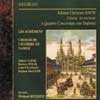Bach, JC Gloria in Excelsis
Eloquent church music lifted by the Bach talent is given praiseworthy performances
View record and artist detailsRecord and Artist Details
Composer or Director: Johann Christian Bach
Genre:
Vocal
Label: Ricercar
Magazine Review Date: 2/2003
Media Format: CD or Download
Media Runtime: 61
Mastering:
Stereo
DDD
Catalogue Number: RIC211

Tracks:
| Composition | Artist Credit |
|---|---|
| Gloria |
Johann Christian Bach, Composer
(Les) Agrémens Barbara Hölzl, Contralto (Female alto) Johann Christian Bach, Composer Lluis Vilamajó, Tenor Namur Chamber Choir Stephan MacLeod, Bass Valérie Gabail, Soprano Wieland Kuijken, Zedlau |
| Kyrie |
Johann Christian Bach, Composer
(Les) Agrémens Johann Christian Bach, Composer Lluis Vilamajó, Tenor Namur Chamber Choir Valérie Gabail, Soprano Wieland Kuijken, Zedlau |
| Credo |
Johann Christian Bach, Composer
(Les) Agrémens Johann Christian Bach, Composer Namur Chamber Choir Wieland Kuijken, Zedlau |
Author: Stanley Sadie
Johann Christian Bach, who converted to Catholicism during his years in Italy, composed a handful of motets but no complete Mass setting, as far as is known: there are only these three independent movements and another Gloria. They probably date from the late 1750s, just before he became second organist at Milan Cathedral. The Gloria here is a substantial piece, 45 minutes long, in nine movements, six of them solos (four arias, one duet, one trio) in a modern, galant style – sometimes described as ‘operatic’, though the idiom is in fact distinct from that of opera. Only the central ‘Qui tollis’ chorus, with its fugues, would have pleased Johann Christian’s father.
The solo numbers are quite expansive pieces, concerto-like in form, busy and fluent in their string writing, with colourful touches on the wind and from the organ, and eloquent, italianate vocal lines – much as in the young Mozart’s church works of the late 1760s and ’70s. Outstanding among them is the soprano’s ‘Qui tollis’, a beautifully written Largo with a long instrumental introduction, shapely vocal writing and some obbligato music for violin and cello.
The Kyrie is a single choral movement, with a minor-key ‘Christe’ for solo soprano and tenor. The Credo is entirely choral, a continuous movement with a slower, hushed section at ‘Et incarnatus est’, then a lively ‘Et resurrexit’ and a fugal ‘Et vitam venturi’. These works are of course in what is basically the Italian church music style of JC Bach’s time, but underpinned by the solidity of his technique and a richness of harmony and of detail that you don’t often find in Italian music of the time: the result is very attractive.
I have nothing but praise for the performances; the solo singing is not spectacular, but nor should it be, and everything is done with a real feeling for the style under Wieland Kuijken’s direction. I much enjoyed the disc and would warmly recommend it to anyone interested in church music of this period or simply in a little-known side of JC Bach’s output.
The solo numbers are quite expansive pieces, concerto-like in form, busy and fluent in their string writing, with colourful touches on the wind and from the organ, and eloquent, italianate vocal lines – much as in the young Mozart’s church works of the late 1760s and ’70s. Outstanding among them is the soprano’s ‘Qui tollis’, a beautifully written Largo with a long instrumental introduction, shapely vocal writing and some obbligato music for violin and cello.
The Kyrie is a single choral movement, with a minor-key ‘Christe’ for solo soprano and tenor. The Credo is entirely choral, a continuous movement with a slower, hushed section at ‘Et incarnatus est’, then a lively ‘Et resurrexit’ and a fugal ‘Et vitam venturi’. These works are of course in what is basically the Italian church music style of JC Bach’s time, but underpinned by the solidity of his technique and a richness of harmony and of detail that you don’t often find in Italian music of the time: the result is very attractive.
I have nothing but praise for the performances; the solo singing is not spectacular, but nor should it be, and everything is done with a real feeling for the style under Wieland Kuijken’s direction. I much enjoyed the disc and would warmly recommend it to anyone interested in church music of this period or simply in a little-known side of JC Bach’s output.
Discover the world's largest classical music catalogue with Presto Music.

Gramophone Digital Club
- Digital Edition
- Digital Archive
- Reviews Database
- Full website access
From £8.75 / month
Subscribe
Gramophone Full Club
- Print Edition
- Digital Edition
- Digital Archive
- Reviews Database
- Full website access
From £11.00 / month
Subscribe
If you are a library, university or other organisation that would be interested in an institutional subscription to Gramophone please click here for further information.




